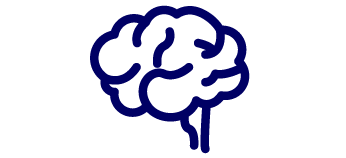Headache sufferers know - your symptoms have the power to derail your day. And some cases, it is so intense your only option is to shut yourself off from the world until the throbbing subsides.
Between work responsibilities, lack of sleep and meeting the demands of family, headaches are commonplace. In fact, according to Mary Megally, D.O., a neurologist at Henry Ford Health, pinpointing the cause of the headache — whether it’s a migraine, tension headache or a cluster headache — dictates the best treatment.
The good new is that there are plenty of treatment options available to help, and researchers are continuing to explore other solutions to relieve head pain. Here, Dr. Megally shares some insight into your best options for treating headaches:
Options For When You Already Have A Headache
Sometimes a headache can sneak up on you. Other times, you might miss signs or symptoms that one is coming on. Whatever the situation, there are plenty of ways to find relief once you are feeling headache pain.
- Over-the-counter medications. Many people turn to over the counter options as their first line of defense for a headache. However, Dr. Megally warns that while these medications can help for a time, medication overuse is extremely common and can cause rebounding headaches or increase your risk of chronic headaches as a result.
- Prescription medications. Medications (called triptans or gepants) may be prescribed by your provider to relieve headache symptoms. Triptans suppress the release of calcitonin gene-related peptide (CGRP), a protein in the brain that is one of the main causes for migraine symptoms. Gepants bind to CGRP to block its effects, relieving your migraine.
Non-pharmaceutical options
- Essential oils. Many people swear by essential oils such as peppermint, lavender and eucalyptus to soothe head pain. In addition to releasing a pleasant aroma, essential oils can help improve circulation and reduce stress (both common headache triggers).
- Biofeedback therapy. This therapy involves uses wearing a device with electric sensors that typically monitor your body’s functions at once (like blood pressure and breathing). For migraine headaches, these devices can help identify muscle tension related to your headaches. Over time, you can learn to be aware of what triggers this tension so you have less headaches.
- Neuromodulation (medical devices). These wearable devices use electrical or magnetic stimulation to reduced pain pathways in the brain that are activated during a headache. There are currently 5 devices on the market that are approved by the Food and Drug Administration for both acute and preventative treatment of migraines.
- Deep breathing. Simply taking time to take some deep breaths can not only calm you down, but it also supplies oxygen to your brain. Taking big deep breaths is one of the most effective ways to relieve a headache and one that is easy to do in any situation.
- Hydration. If you don’t keep your body hydrated, a headache can be brought on by dehydration. Drinking water throughout the day can prevent this. If you already have a dehydration headache, drinking water can help relieve your symptoms after a couple hours.
- Environment modifications. When a headache has begun, it is common to become overstimulated by your environment. Try turning off lights or going to a quiet room to lessen the intensity of your head pain. This strategy also works great when combined with other non-pharmaceutical treatments.
Options For Preventing Headaches
If you suffer from frequent headaches, there are also options you can explore to minimize your head pain all together.
- Supplements. Several supplements have been shown to help reduce the frequency and intensity of headaches including magnesium, vitamin B2, coenzyme Q10 (CoQ10), melatonin and feverfew. Since supplements aren’t FDA-regulated, talk with your doctor before trying out any new supplements for headaches prevention.
- Oral daily medications. If your headaches are severe and frequent enough, your doctor may prescribe medication for you to take every day to prevent future headaches. These medications could include beta-blockers, anti-depressants, anti-seizure medications or gepants.
- Botox. While this potent toxin is probably best known for minimizing the appearance of lines and wrinkles, it can also be an effective therapy for headaches. Botox blocks sensory receptors to prevent the affects of a migraine. Doctors may inject the toxin in up to 31 sites on the forehead, the sides of the head, the back of the head and even some shoulder muscles.
- Monthly injections. This new treatment involves getting regular injections of medication that targets CGRP to block its effects.

Non-pharmaceutical options
Making modifications to your lifestyle can have also help prevent you from getting a headache in the first place. Put these best practices in place to reduce your headache intensity and frequency:
- Get adequate sleep
- Drink plenty of water
- Have several well-balanced meals throughout the day
- Avoid alcohol
- Limit your caffeine intake
- Manage your stress levels
Before you rush to any of these remedies, Dr. Megally recommends keeping a headache diary to help track the frequency of your headaches and what preceded them (hunger, stress, bright lights). “The log not only helps identify potential triggers, it can also offer insight about whether you’re improving with a particular treatment,” says Dr. Megally. “From there, talk with your doctor before trying anything new to combat your symptoms. Your primary care doctor or a neurologist can suggest the best treatment for you based on the symptoms."
If you’re having more than two headaches each week, or you’re taking over-the-counter medication to relieve headaches more than a few times a week, it’s best to get checked out by a physician. Even if you’ve been suffering from migraine headaches for decades, if you experience a change in how the headache behaves, consult your physician. Memory lapses, blurring vision, or a headache that doesn’t go away could indicate an underlying medical issue.
Reviewed by Dr. Mary Megally, a neurologist who sees patients at Henry Ford Medical Centers - Bloomfield Township and Royal Oak.



